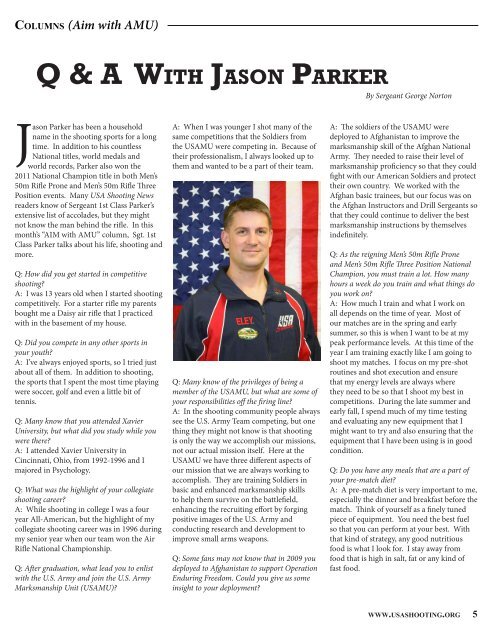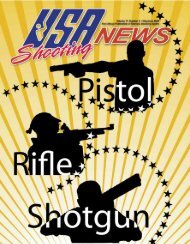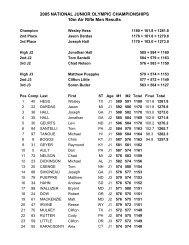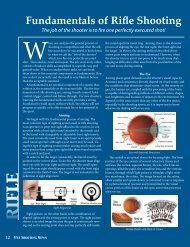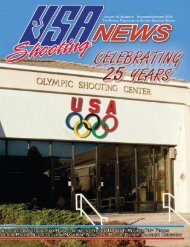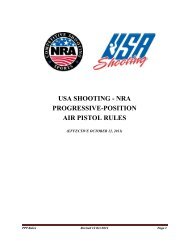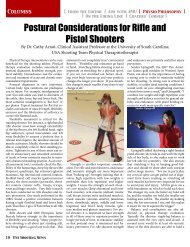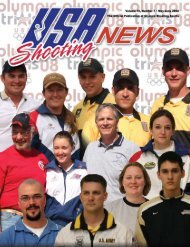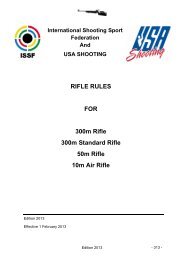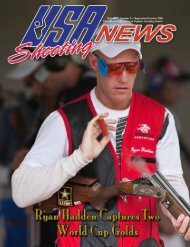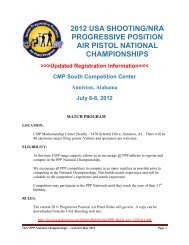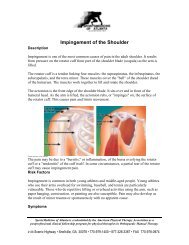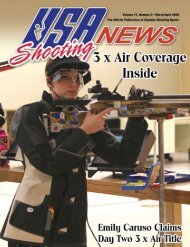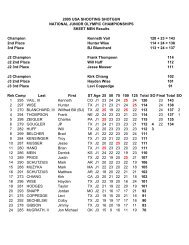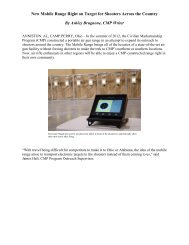September/October 2011: Volume 19, Number 5 - USA Shooting
September/October 2011: Volume 19, Number 5 - USA Shooting
September/October 2011: Volume 19, Number 5 - USA Shooting
Create successful ePaper yourself
Turn your PDF publications into a flip-book with our unique Google optimized e-Paper software.
COLUMNS (Aim with AMU)<br />
Q & A WITH JASON PARKER<br />
By Sergeant George Norton<br />
Jason Parker has been a household<br />
name in the shooting sports for a long<br />
time. In addition to his countless<br />
National titles, world medals and<br />
world records, Parker also won the<br />
<strong>2011</strong> National Champion title in both Men’s<br />
50m Rie Prone and Men’s 50m Rie ree<br />
Position events. Many <strong>USA</strong> <strong>Shooting</strong> News<br />
readers know of Sergeant 1st Class Parker’s<br />
extensive list of accolades, but they might<br />
not know the man behind the rie. In this<br />
month’s “AIM with AMU” column, Sgt. 1st<br />
Class Parker talks about his life, shooting and<br />
more.<br />
Q: How did you get started in competitive<br />
shooting?<br />
A: I was 13 years old when I started shooting<br />
competitively. For a starter rie my parents<br />
bought me a Daisy air rie that I practiced<br />
with in the basement of my house.<br />
Q: Did you compete in any other sports in<br />
your youth?<br />
A: I’ve always enjoyed sports, so I tried just<br />
about all of them. In addition to shooting,<br />
the sports that I spent the most time playing<br />
were soccer, golf and even a little bit of<br />
tennis.<br />
Q: Many know that you attended Xavier<br />
University, but what did you study while you<br />
were there?<br />
A: I attended Xavier University in<br />
Cincinnati, Ohio, from <strong>19</strong>92-<strong>19</strong>96 and I<br />
majored in Psychology.<br />
Q: What was the highlight of your collegiate<br />
shooting career?<br />
A: While shooting in college I was a four<br />
year All-American, but the highlight of my<br />
collegiate shooting career was in <strong>19</strong>96 during<br />
my senior year when our team won the Air<br />
Rie National Championship.<br />
Q: Aer graduation, what lead you to enlist<br />
with the U.S. Army and join the U.S. Army<br />
Marksmanship Unit (<strong>USA</strong>MU)?<br />
A: When I was younger I shot many of the<br />
same competitions that the Soldiers from<br />
the <strong>USA</strong>MU were competing in. Because of<br />
their professionalism, I always looked up to<br />
them and wanted to be a part of their team.<br />
Q: Many know of the privileges of being a<br />
member of the <strong>USA</strong>MU, but what are some of<br />
your responsibilities o the ring line?<br />
A: In the shooting community people always<br />
see the U.S. Army Team competing, but one<br />
thing they might not know is that shooting<br />
is only the way we accomplish our missions,<br />
not our actual mission itself. Here at the<br />
<strong>USA</strong>MU we have three dierent aspects of<br />
our mission that we are always working to<br />
accomplish. ey are training Soldiers in<br />
basic and enhanced marksmanship skills<br />
to help them survive on the battleeld,<br />
enhancing the recruiting eort by forging<br />
positive images of the U.S. Army and<br />
conducting research and development to<br />
improve small arms weapons.<br />
Q: Some fans may not know that in 2009 you<br />
deployed to Afghanistan to support Operation<br />
Enduring Freedom. Could you give us some<br />
insight to your deployment?<br />
A: e soldiers of the <strong>USA</strong>MU were<br />
deployed to Afghanistan to improve the<br />
marksmanship skill of the Afghan National<br />
Army. ey needed to raise their level of<br />
marksmanship prociency so that they could<br />
ght with our American Soldiers and protect<br />
their own country. We worked with the<br />
Afghan basic trainees, but our focus was on<br />
the Afghan Instructors and Drill Sergeants so<br />
that they could continue to deliver the best<br />
marksmanship instructions by themselves<br />
indenitely.<br />
Q: As the reigning Men’s 50m Rie Prone<br />
and Men’s 50m Rie ree Position National<br />
Champion, you must train a lot. How many<br />
hours a week do you train and what things do<br />
you work on?<br />
A: How much I train and what I work on<br />
all depends on the time of year. Most of<br />
our matches are in the spring and early<br />
summer, so this is when I want to be at my<br />
peak performance levels. At this time of the<br />
year I am training exactly like I am going to<br />
shoot my matches. I focus on my pre-shot<br />
routines and shot execution and ensure<br />
that my energy levels are always where<br />
they need to be so that I shoot my best in<br />
competitions. During the late summer and<br />
early fall, I spend much of my time testing<br />
and evaluating any new equipment that I<br />
might want to try and also ensuring that the<br />
equipment that I have been using is in good<br />
condition.<br />
Q: Do you have any meals that are a part of<br />
your pre-match diet?<br />
A: A pre-match diet is very important to me,<br />
especially the dinner and breakfast before the<br />
match. ink of yourself as a nely tuned<br />
piece of equipment. You need the best fuel<br />
so that you can perform at your best. With<br />
that kind of strategy, any good nutritious<br />
food is what I look for. I stay away from<br />
food that is high in salt, fat or any kind of<br />
fast food.<br />
WWW.<strong>USA</strong>SHOOTING.ORG 5


